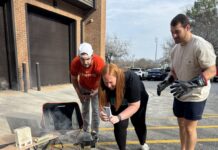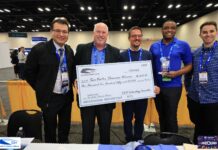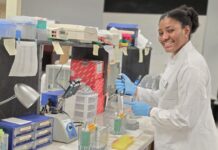A Mercer University professor is working to bridge the gap of understanding between veterans and civilians through one of her courses this semester. The 19 students in Dr. Katherine Roseau’s Integrative Studies (INT) 201: Building Community class have been conducting in-depth research on issues related to veterans and are proposing potential solutions.
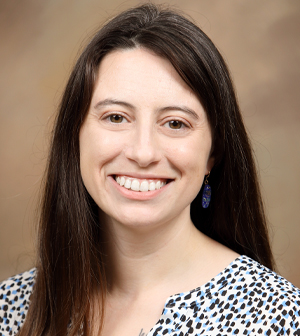
Earlier this semester, they read personal narratives from veterans and their families and contacted veterans in the community. During a Zoom program on Nov. 10 that was open to the community, the students gave short “flash presentations” on their projects and then heard five Tillman Scholars speak about their military experiences and research endeavors.
“It was really great to see the interaction between the Tillman scholars and the students. I was really glad that my students were able to have an audience beyond me to present their work,” said Dr. Roseau, assistant professor of French. “I want to make students aware of what (military members and their families) go through, but also it’s one example of how they can research an issue in-depth. I hope that they can take that on and be able to continue to be compassionate people and try to understand others’ experiences.”
Dr. Roseau’s research focus is life writing of World War II and the Holocaust in France. She and former Mercer professor Lt. Col. Casey Geist have applied for grant funding for a project on dialogues on the experiences of war. The theme of Dr. Roseau’s INT 201 course was born out of her desire to tie her research and background back to her immediate community, she said.
She connected with Capt. Jessica Huerta, a Tillman Scholar and veteran, through a Facebook writing group, and Huerta then helped recruit four other Tillman Scholars to speak during the Zoom program. The Tillman Scholars program provides service members, veterans and military spouses with support for their academic pursuits and professional development as well as a national network of mentors.
Tillman Scholars use their experiences in the military to try to make the world a better place through their research projects and initiatives, Huerta said. Dr. Roseau’s class is a reflection of the goals of the Pat Tillman Foundation.
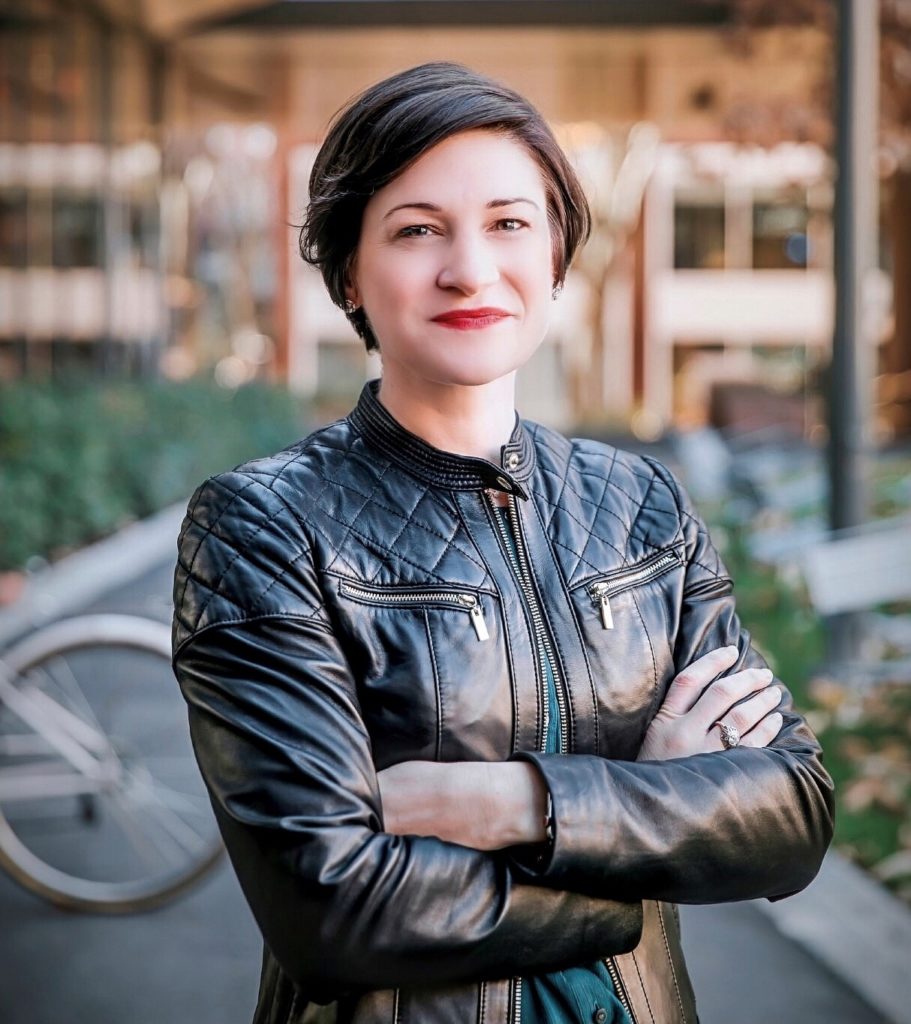
“It was incredible to hear really thoughtful ideas and recommendations the students were bringing to some really difficult challenges,” said 2007 Mercer graduate Ashley Whitlock, another Tillman Scholar who spoke during the Zoom program. “I think the idea of creating a window into (military) life for students who may not have had direct experience with the military was very important … a pathway to understand.”
Autaria Morgan, a sophomore biology major, is doing her research project on the effects of the homecoming of service women and their adjustment back into family life. She doesn’t have any veterans or military members in her family, and she said the class and its discussions have been eye-opening and interesting. The stories the Tillman Scholars shared during the program were very powerful.
“I enjoyed how honest and raw they were. I feel like as civilians you don’t hear stories like that every day. If I wasn’t in this class, I would have never heard these perspectives,” she said.
Whitlock, whose background is in communication and recently completed her master’s degree in public administration at Harvard Kennedy School, talked to the Mercer students about her experiences as a military spouse and widow. Her husband, Capt. Nick Whitlock, a 2005 Mercer graduate, was killed in 2012 while serving in the U.S. Air Force. She said she was ill-prepared for how public her loss was and how confusing it was to navigate the system of benefits.
“One thing that really struck me was the sense of identity loss that I found,” she said. “I was no longer attached to the military as an active duty family member, but I also didn’t totally feel like a civilian. I went from being an independent, high-functioning individual to overnight being unable to make the simplest decisions for myself.”
During her master’s studies, she looked at the intersection of support services and public policy. There’s a need for better practices for supporting survivors without making them have to relive their trauma, she said. She wants to focus her career on helping other women navigate personal crises and start over.
“My military family went to great lengths to support me in my time of need,” Whitlock said. “The commitment I carry with me now is to do whatever is possible to give back to them, to support them, to return the favor. I was excited to participate in this discussion and to share one perspective of our military spouses and family. I think something I’m constantly reminded of is that behind every active duty service man and woman, every veteran, every life lost are fathers, mothers, sisters, brothers … the military family is so big and deep.”
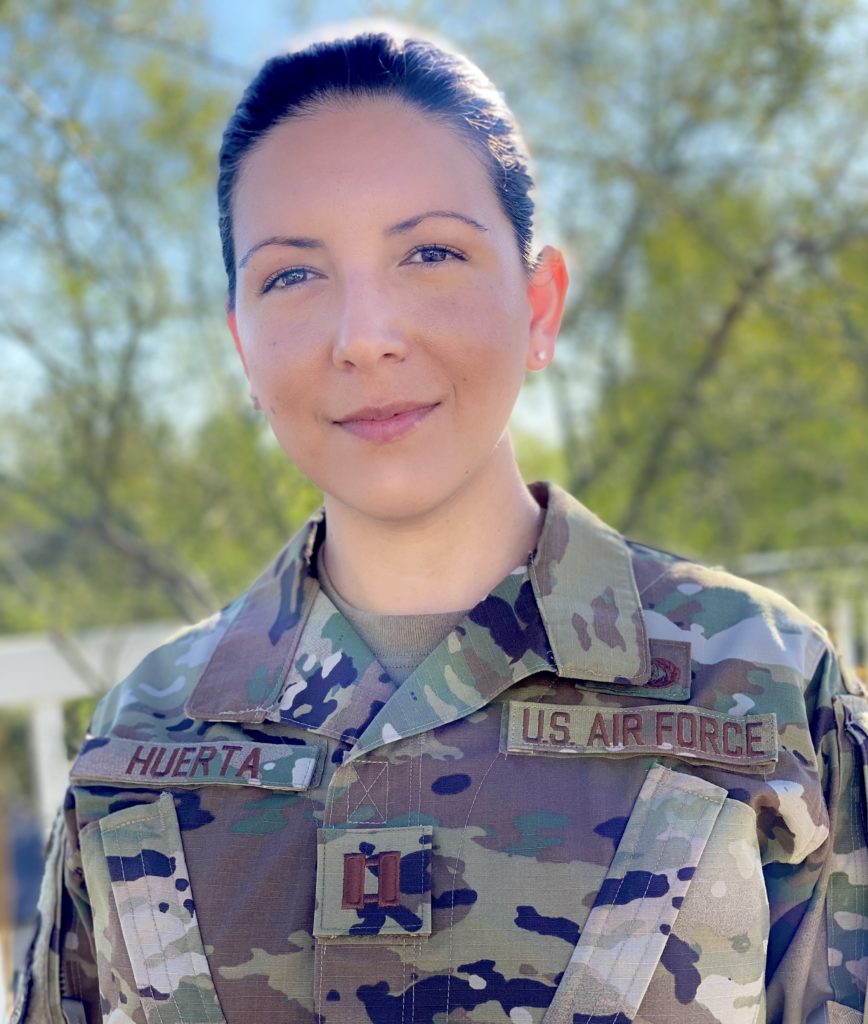
Huerta served six years active duty for the U.S. Air Force and then began working with the California Air National Guard, spending eight years as an equal opportunity adviser and the past four years as a public affairs officer. She is a sociology doctoral candidate at the University of California-Los Angeles. Her master’s thesis looked at the media representation of women in combat, and her dissertation focuses on the constraints, challenges and evolving cultural ideas about masculinity and fatherhood.
“In general, I think there is a disconnect in our generation with veterans and civilians that have never served or had a family member that served,” Huerta said. “I thought this class that Dr. Roseau put together learning about veterans’ issues and how they connect to the broader community was very interesting. I think that’s something that we need to address as a country. Doing that at a local level with students was fantastic.”
It’s important for more of the population to be knowledgeable about veterans issues, so they can help with the transition back to civilian life. The Zoom program allowed students to meet a diverse group of veterans.
“The most important piece is just meeting a veteran and know that we are people too and not to think of veterans in the abstract,” Huerta said.


